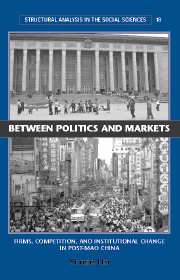Book contents
- Frontmatter
- Contents
- Tables and Figures
- Acknowledgments
- Introduction: Economic Market and Political Market
- 1 Chinese Industrial Enterprises: A Bird's-Eye View
- 2 Central Planning and Its Decline
- 3 The Rugged Terrain of Competition
- 4 Referee as Player: Menaces and Opportunities for Industrial Firms
- 5 Erosion of Authority Relations: A Tale of Two Localities
- 6 Favor Seeking and Relational Constraints
- 7 Competition, Economic Growth, and Latent Problems
- Conclusion
- Appendix A Statistical Data Sources
- Appendix B Methodological Note on Case Studies
- Bibliography
- Index
7 - Competition, Economic Growth, and Latent Problems
Published online by Cambridge University Press: 15 July 2009
- Frontmatter
- Contents
- Tables and Figures
- Acknowledgments
- Introduction: Economic Market and Political Market
- 1 Chinese Industrial Enterprises: A Bird's-Eye View
- 2 Central Planning and Its Decline
- 3 The Rugged Terrain of Competition
- 4 Referee as Player: Menaces and Opportunities for Industrial Firms
- 5 Erosion of Authority Relations: A Tale of Two Localities
- 6 Favor Seeking and Relational Constraints
- 7 Competition, Economic Growth, and Latent Problems
- Conclusion
- Appendix A Statistical Data Sources
- Appendix B Methodological Note on Case Studies
- Bibliography
- Index
Summary
From 1978 to 1998 China's gross domestic product grew at an average annual rate of 9.7% (GJTJJa 1999: 58). During the same period of time, exchange relations significantly expanded in both economic activities and the political process. These concurrent developments contrast sharply with images of economic stagnation and decline in countries with widespread corruption and rent seeking (e.g., Bates 1981; Mauro 1995; Myrdal 1968; Olson 1982; Rose-Ackerman 1999). In the preceding chapters, I have discussed how the growing political market has played an important role in bringing down the plan while shaping the competitive advantage of industrial firms in profit-oriented economic activities. In this chapter, I explore the seemingly puzzling concurrence of sustained economic growth and marketization of the political process.
I propose a two-step approach to this issue. First, it is important to explain why in the short run the rise of the political market has not resulted in the kinds of retarding effects on economic growth that figure so prominently in the literature on corruption and rent seeking. Second, it is equally important to examine latent problems that have developed during the past two decades and may fully manifest themselves down the road.
I argue that competition holds a key to understanding the short-term outcome of economic institutional change. The initial impetus came from the profit-making opportunities unleashed by sweeping rural decollectivization amidst huge pent-up demand in the late 1970s and early 1980s.
- Type
- Chapter
- Information
- Between Politics and MarketsFirms, Competition, and Institutional Change in Post-Mao China, pp. 169 - 196Publisher: Cambridge University PressPrint publication year: 2001



